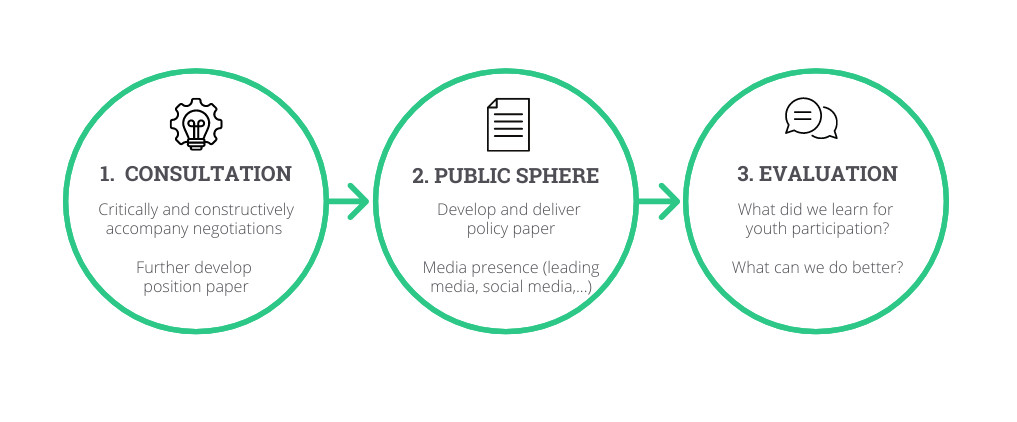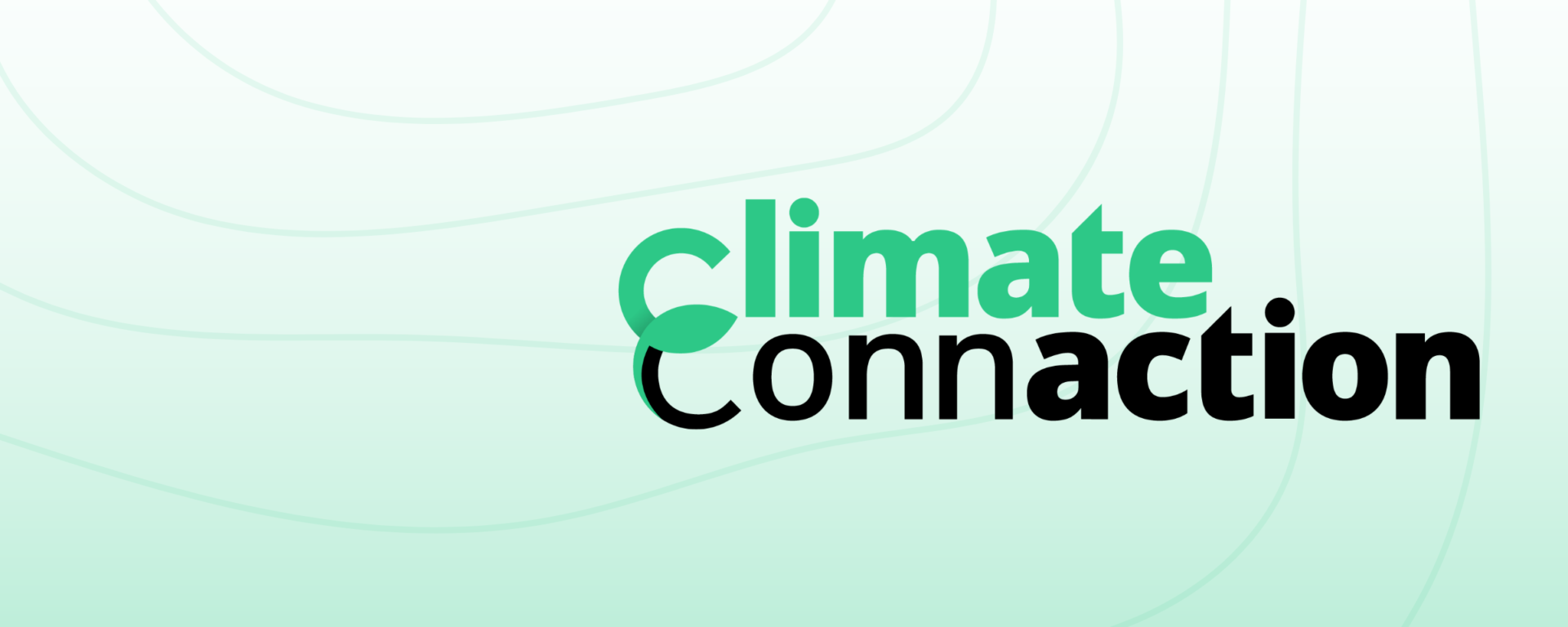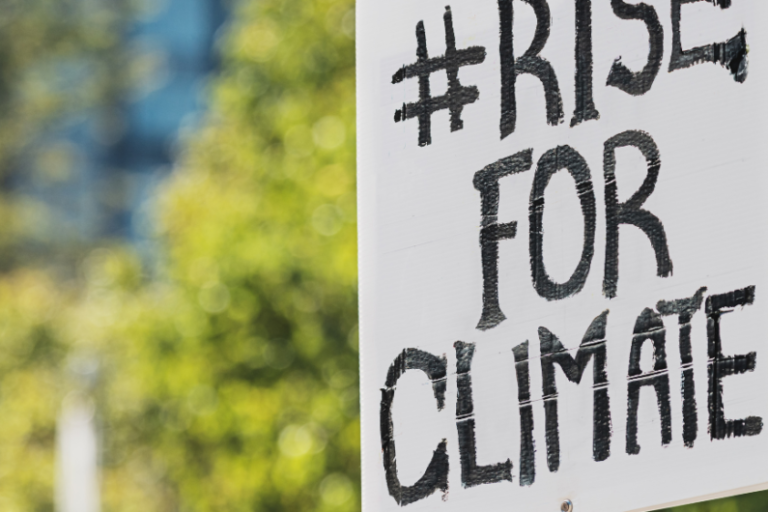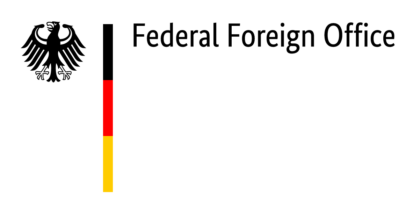Under the title “Climate Connaction,” the young generation committed to climate policy is getting involved in climate foreign policy. In a structured participation and consultation process, representatives of young civil society develop joint ideas and work out concrete positions and recommendations for action to shape German and European climate foreign policy. In addition, the project promotes and networks young people from Germany, Central and Eastern Europe and the Western Balkans who are committed to climate policy.
The fight against the climate crisis is characterized by a generational conflict: While older generations of the present determine our climate policy, young and future generations in particular will feel the effects of the climate crisis. Moreover, it is a global challenge that our democracy can only meet effectively with international and transnational cooperation. That is why youth organizations and large parts of the climate movement have been calling for years for the perspective and expertise of young people to be given greater consideration in the German government’s climate policy. Thus – in order to create the necessary conditions for effective participation and consultation – the sometimes selective exchange with young civil society should be integrated much more systematically and strategically into the government’s everyday work than has been the case to date.
The Federal Foreign Office has taken up this demand for the important policy field of “climate foreign policy” and has been supporting the “Climate Connaction” project since March 2023. In this pilot project, young adults from various organizations and associations network nationally and transnationally in the Youth & Climate Foreign Policy working group and through a fellowship under the project sponsorship of Das Progressive Zentrum and with the support of the Federal Foreign Office. In this way, they are to build up joint expertise in climate foreign policy, pool forces and facilitate a transfer of knowledge between politics, civil society organizations and young representatives of the climate protection movement.
The pilot project comes at a time when the relationship between politics and young people committed to climate policy is facing major challenges. The German government is resorting to new fossil resources due to the war of aggression on Ukraine. Measures that are more sustainable in terms of climate policy, such as the Buildings Energy Act, are also causing controversy because they have a direct impact on everyday life. At the same time, the climate change movement is calling for faster action by policymakers, as time is running out to stem the climate crisis. In the process, however, more drastic forms of protest provoke further controversy. Under these conditions, new participation and consultation formats are needed to empower young people to bring their constructive ideas and recommendations for action to policy makers at the right time and place. This is the goal of Climate Connaction.
The two strands of the project:
The project follows two strands: First, the “Youth & Climate Foreign Policy working group” was constituted in March 2023. It develops inputs on central areas of German climate foreign policy, brings them into the decisive negotiation phases on the way to COP 28 and publicly represents their demands. The second strand is the Climate Action Fellowship, which networks young people from Germany, Central and Eastern Europe and the Western Balkans and empowers them through targeted training and education. Through capacity building, civil society engagement in climate foreign policy is to be strengthened, especially in a transnational context.
Strategic Lead
Youth & Climate Foreign Policy working group
Background
The effects of the climate crisis are being felt by everyone worldwide – but young generations will be particularly affected in the future. At the same time, young people have so far been unable to exert sufficient influence on the political decisions of the present that are relevant to the future, beyond various forms of protest. This is why youth organizations and large parts of the climate movement have been demanding for years that the perspective and expertise of young people be given greater consideration in the German government’s climate policy. Thus – in order to create the necessary conditions for effective participation and consultation – the sometimes sporadic exchange with young civil society should be integrated much more systematically and strategically into everyday government life than has been the case to date.
The State Secretary and Special Envoy for International Climate Action at the Federal Foreign Office, Jennifer Morgan, has taken up this demand. She supports a structured youth participation and consultation process for “climate foreign policy,” for which Jennifer Morgan has technical and political responsibility in the German government. And so, in March 2023, under the sponsorship of Das Progressive Zentrum and with the support of the German Foreign Office, the “Youth & Climate Foreign Policy working group” was constituted as a pilot project. In the preceding months, a group of initiators held initial meetings at which they agreed on the nomination of selected personalities from youth associations and climate policy initiatives.
Claim
Since spring 2023, a total of 15 young people committed to climate policy from various institutions and initiatives relevant to civil society and climate policy have organized themselves in the Youth & Climate Foreign Policy Working Group. The working group is composed of representatives of youth associations and activists, taking into account diversity criteria such as gender, migration background and social class. The aim is to provide an opportunity for the young generation to develop common ideas in a structured, policy-oriented process and to develop concrete positions and recommendations for action that can be heard by the German government, among others, and can be directly incorporated into the decisive phases of climate policy negotiations.
The declared goal is to enable a transfer of knowledge between politics, civil society organizations and young representatives of the climate protection movement. An overarching goal of this project is also to explore possibilities and generate concrete examples of what good participation can (and perhaps cannot!) look like in terms of a process that is as inclusive as possible, but also of high quality results and political impact.
Because we think: Structured youth participation and consultation should not only be an abstract claim of modern government policy, but increasingly become lived practice.
Process
The project is initially designed along the milestones of international climate policy leading up to Conference of the Parties (COP) 28 in Dubai. Specifically, the project is divided into three phases:

In the first phase (constitution and consultation phase) from March to June 2023, the focus is on the constitution of the working group and the critical-constructive monitoring of the climate policy negotiation status in the run-up to the COP. After an initial exchange of technical policy, members of the working group have developed inputs on the following four topics: (1) Mitigation & Adaptation, (2) Just Transition, (3) Climate Finance Goals and (4) Loss & Damage.
The working group compiled these four inputs into a first position paper, which was first sent to relevant political actors in Berlin and Brussels in early May 2023 and has since been further developed in an iterative process.
The demands and recommendations for action outlined in the working group’s position paper were already critically discussed in early summer 2023 with State Secretary Jennifer Morgan, Minister of State Anna Lührmann and the relevant departments from the Federal Foreign Office. In further political discussions, including the Petersberg Climate Dialogue in May 2023 and the Bonn Climate Change Conference in June 2023, the paper was also discussed with selected members of the German Bundestag, leading representatives of climate delegations (“Heads of Delegations”), and representatives of climate NGOs and climate science.
In the second phase, starting in July 2023, the working group will develop a Climate Action Paper that is to be presented to the public at the level of state secretaries and ministers by COP 28. In this phase, there will be delegation trips in September and October 2023 with numerous high-level climate policy talks in Berlin. In addition, the public exchange with representatives from the media, science and civil society will be intensified.
In the third phase, starting in November 2023, the working group process will be evaluated together with all those who participated as members, advisors, or political addressees, with one primary goal: Together, we want to critically reflect and learn how the structured participation of young people in government policy in general and German climate foreign policy in particular can be (even) better achieved in the future. Guiding questions are: What have we learned in the process about working together in a heterogeneous group and how can existing potentials and resources be (even) better used in the future? What are the learnings for such youth participation processes in government policy? And which steps towards further institutionalized participation in the climate foreign policy are conceivable or how can it concretely continue in 2024?
The findings generated in this phase on the conditions for success of good government participation by young civil society are then to be published in a final step of the pilot project and also publicly discussed in various formats. Because as outlined above: In this project, we would like to jointly explore possibilities of how effective co-creation of German climate foreign policy can look like. We would like to collect experiences and generate concrete examples of good (and also improvable) participation in terms of inclusion in the process, quality of results and political effectiveness. And ideally make a small contribution to further institutionalizing structured youth participation and consultation processes in government policy.
Project context
The Youth & Climate Foreign Policy working group is part of the overall project “The Climate Connaction”, which Das Progressive Zentrum is implementing in cooperation with the German Federal Foreign Office, initially in the period between March and December 2023. The second sub-project of The Climate Connaction is the “Climate Action Fellowship”, in which 25 young committed people from Germany, Central and Eastern Europe, and the Western Balkans are offered a space for targeted training, advanced training, and political exchange formats. Through this form of networking and capacity building, civil society engagement in climate foreign policy is to be strengthened in the national, but especially in the transnational framework.
In order for the working group members to continue networking, exchanging ideas and forging alliances across national borders, at least two physical as well as numerous digital meeting formats between the working group Youth & Climate Foreign Policy and the Climate Action Fellows are planned for fall 2023.
Lead Youth & Climate Foreign Policy working group
Projectnews
Climate Connaction: Youth Climate Fellowship Program
Funding

We develop and debate progressive ideas and bring together leading actors who turn thoughts into action. Our think tank’s goal: making the just transformation a reality. ▸ Learn more







